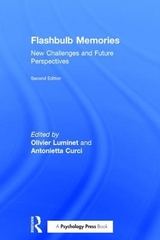
Flashbulb Memories
Psychology Press Ltd (Verlag)
978-1-84169-672-0 (ISBN)
- Titel erscheint in neuer Auflage
- Artikel merken
We all have memories of highly emotional personal and public events that may have happened some years ago but which are felt as strongly as if they happened yesterday. We remember where they happened, the people who were with us, and seemingly irrelevant details such as the weather, particular sounds or specific clothes. Why do we remember these things? Is it because such events are so deeply emotional or so unexpected or because people talk about them so many times? Why are these "flashbulb memories" so vivid and lasting?
Flashbulb Memories: New Issues and New Perspectives explores these questions in the first book on flashbulb memories (FBMs) for more than a decade. It considers the many developments over the last 10 years, including new models of FBM formation, advances in statistical methods and neuroscience, and two key public events, the death of Princess Diana and the September 11th attacks in the US, which can help test FBM. The book examines the status of FBMs as "special" or "ordinary" memory formations, and the expert contributors represent a balance between those that favour each approach. It also investigates controversial topics of research such as:
Are emotional, cognitive, or social factors highly relevant for the formation of FBMs?
How can sociological, historical, and cultural issues help us to understand the process of FBMs?
What are the differences between FBMs, memories for traumatic experiences, and highly vivid personal memories?
How can we provide a valid and reliable measure for FBMs?
This book gathers together specialists in the field in order to make significant progress in this area of research which has remained divisive for the past 30 years. It will provide essential reading for researchers in FBM and also be of interest to those in related areas such as social psychology, cognitive psychology, cross-cultural psychology, sociology, political sciences and history as well as clinicians dealing with those who have strong FBMs after personal traumatic events.
Olivier Luminet is Research Associate at the Belgian National Fund for Scientific Research (FNRS-FRS), as well as Associate Professor at the Catholic University of Louvain (UCL), Belgium and at the Free University of Brussels, Belgium. Antonietta Curci is Associate professor at the University of Bari in Italy.
Luminet, Curci, Introduction. Part 1. Methods, Statistics, and Modelling Issues. Curci, Measurement Issues in the Study of Flashbulb Memory. Wright, Flashbulb Memory Methods. Luminet, Models for the Formation of Flashbulb Memories. Part 2. Consistency and Accuracy. Talarico, Rubin, Flashbulb Memories Result from Ordinary Memory Processes and Extraordinary Event Characteristics. Julian, Bohannon III, Aue, Measures of Flashbulb Memory: Are Elaborate Memories Consistently Accurate? Part 3. Individual Factors: Clinical and Development Issues. Pillemer, "Hearing the News" versus "Being There": Comparing Flashbulb Memories and Recall of First-Hand Experiences. Budson, Gold, Flashbulb, Personal, and Event Memories in Clinical Populations. Fivush, Bohanek, Marin, McDermott Sales, Emotional Memory and Memory for Emotions. Part 4. Social Factors: Identity, Culture, and Collective Memory. Berntsen, Flashbulb Memory and Social Identity. Hirst, Meksin, A Social-Interactional Approach to the Retention of Collective Memories of Flashbulb Events. Páez, Bellelli, Rimé, Flashbulb Memories, Culture, and Collective Memories: Psychosocial Processes Related to Rituals, Emotions, and Memories. Wang, Aydin, Cultural Issues in Flashbulb Memory. Curci, Luminet, General Conclusions.
| Erscheint lt. Verlag | 19.11.2008 |
|---|---|
| Zusatzinfo | 23 Line drawings, black and white; 16 Tables, black and white; 23 Illustrations, black and white |
| Verlagsort | Hove |
| Sprache | englisch |
| Maße | 156 x 234 mm |
| Gewicht | 612 g |
| Themenwelt | Geisteswissenschaften ► Psychologie ► Allgemeine Psychologie |
| Geisteswissenschaften ► Psychologie ► Biopsychologie / Neurowissenschaften | |
| ISBN-10 | 1-84169-672-2 / 1841696722 |
| ISBN-13 | 978-1-84169-672-0 / 9781841696720 |
| Zustand | Neuware |
| Haben Sie eine Frage zum Produkt? |
aus dem Bereich



